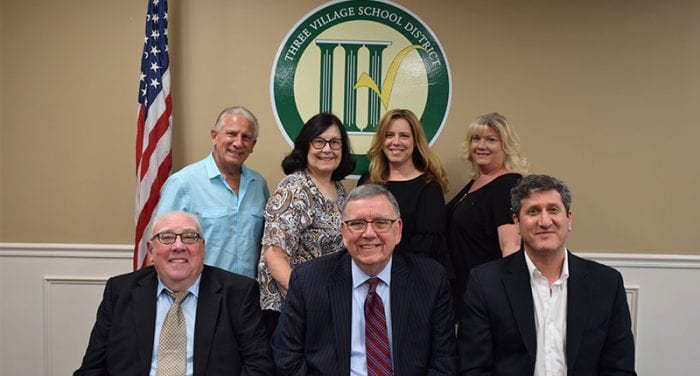Three Village Central School District Hosts First In-person BOE Meeting in Months

By Andrea Paldy
The first in-person Three Village school board meeting since schools closed due to the coronavirus pandemic July 8 was eventful. Everyone wore mandatory face masks, and seating was arranged for social distancing. Most notable was the tense public participation session marked by sharp opinions.
“It is important tonight that we distinguish the personal from the political.”
— David McKinnon
There was also the routine swearing in of board members — incumbents Inger Germano, Irene Gische and Dr. Jeff Kerman — for new terms. The board elected Germano as its new president. She succeeds Bill Connors, who continues to serve as a trustee. Gische was reelected vice president.
Rising to the forefront, though, were recent parental criticisms of the district, though those who spoke during the meeting sought to balance their criticism about distance learning and district governance with their support for teachers.
“It is important tonight that we distinguish the personal from the political,” said David McKinnon, a professor of Neurobiology at Stony Brook University and recently an unsuccessful school board candidate.
“At a personal level, there’s a high level of respect for the teachers in our district, and there are deep ties of gratitude within the community to individual teachers for their efforts to advance the education of our children,” said McKinnon, who was not on the slate of candidates endorsed by the Three Village Teachers Association.
However, he said, when it came to the political system, the school board elected to “facilitate parental oversight” of the district wasn’t doing its job. The TVTA, he said, is both a labor union and a special interest lobby group, which “aggressively pursues its own agenda,” and has made decisions for the district that exacerbated an already challenging situation.
McKinnon went on to say that he believed that the nearly 3,800 votes cast for both him and Shaorui Li respectively represented “a massive vote of no confidence” in the board and union leadership. In order to win back the trust of a large segment of parents, McKinnon said the district would need to have a “clean and functional school board, with independent, parent-backed candidates who know and care about education.”
Li said that she and other parents wanted to help teachers, not attack them.
“In the Asian culture, we have a very high respect for teachers, and we rely on teachers to give our kids their education,” the engineer and entrepreneur said.
McKinnon’s wife, Barbara Rosati, who is president of the Three Village Parents Alliance, which counts more than 250 district families among its members, also spoke. She made the distinction between her concerns about TVTA president Claudia Reinhart’s “role in the governance of our district and its consequences on our children” and her appreciation for the district’s teachers.
“I cannot believe I was dragged here tonight to say unequivocally that we support and we love our teachers, that we believe in their expertise and guidance,” she said, alluding to the pandemic. Rosati, a research assistant professor at the Department of Physiology and Biophysics at SBU, questioned the leadership of Reinhart, who she said “is not teaching currently and is not involved in any parent-teacher interaction.”
She added that it was “irresponsible and cruel to let teachers believe that our community is at war with them.”
Addressing teachers and administrators, Rosati added: “We have your backs. We will be here to help and support you like we have always done.”
“I am here because we, along with our administrator colleagues and the board of education, are under attack.”
— Claudia Reinhart
Reinhart rejected claims that the criticism was not directed at the teachers, paraprofessionals and teaching assistants the union represents.
“I am here because we, along with our administrator colleagues and the board of education, are under attack,” she said.
The union president said they’d been forced to listen to people “like Ms. Rosati” and others who had written to the board to “demand answers and reactions to nothing more than hearsay — hearsay that is usually completely incorrect.”
Reinhart, who taught music in the district, said the union does not try to hide the fact that it endorses candidates.
“Why would we?” she asked. “We want people on the board who understand public education and the needs of students and staff. We want people on the board with a proven record of overcoming challenges and moving us forward in good times and bad. Your candidates lost the election. The community has spoken. You need to get over it.”
Reinhart directed comments to the many teachers at the meeting.
“We must stand together united against this attack,” she said. “We must stand together to defend our professions, the work we do and the job we have done. We have nothing to be ashamed of. It is time we started saying that out loud.”
She urged parents, teachers, administrators and the community “to stand up and say, ‘Enough.’” She ended by drawing from the words of the late Albert Shanker, former president of the United Federation of Teachers and American Federation of Teachers, saying, “Along with the responsibility of negotiating good contracts, it is the obligation of teacher unions to preserve public education.”
“That is our goal,” Reinhart told the audience. “There is nothing less at stake than our future,” she added, sparking enthusiastic applause.
Fall Plans
Besides those who spoke in-person at last week’s meeting, three parents sent letters that included appreciation for teachers, but also expressed concern about the district’s spring execution of remote learning, plans for the fall and limited communication from the school district.
“We must be prepared for whatever the decision may be from the state Education Department and the governor.”
— Kevin Scanlon
Responding, Superintendent Cheryl Pedisich said that she shared parents’ frustration about the upcoming school year.
“I feel as though we are all navigating in the dark at this point because we have not received any direction at all from our governor [Andrew Cuomo (D)] or the SED [New York State Education Department],” she said.
Earlier that day Pedisich had sent a letter acknowledging parents’ “unanswered questions about the reopening of school this fall” and shared the governor’s most recent plan to release guidance July 13 [see details at end of article] and require districts to return their plans for reopening by July 31.
During the meeting, Pedisich noted that other states — Connecticut, New Jersey, Massachusetts, among them — had already provided their school districts with plans for reopening.
“I will tell you that we are working very hard … over the last several weeks, and I apologize for the lack of communication,” she said, adding that she would not “deal in conjecture and supposition,” because she didn’t think it was fair to families and staff.
The superintendent specifically addressed concerns about remote learning.
“We are looking at all options to make it more effective for our families,” she said. “We understand that there were numerous challenges, and we won’t make excuses for those. But moving forward, I think we are in a much better place. And I have great confidence in the members of our team, and I have confidence in our administration, our staff and our parents. We will do the best for the community. We owe it to them, and they deserve nothing less.”
So far, Pedisich said, the district plans for every student from kindergarten to 12th grade to have access to a Chromebook for remote instruction, and a survey about distance learning was sent out to parents and staff last week.
In an email, Kevin Scanlon, assistant superintendent for educational services, said the district has also offered more than 90 courses to its staff, with the majority focused on online instruction. There are more than 1,500 teachers, administrators, assistants and paraprofessionals enrolled in the courses to prepare for the fall, he said.
“We must be prepared for whatever the decision may be from the state Education Department and the governor,” Scanlon said.
The state released its reopening guidelines on Monday. The document offers districts guidance on face coverings for staff and students, configuring classrooms, hallways, lunchrooms and other shared spaces to maintain social distance and safety, as well as recommendations for ways to maximize in-person instruction. While the document states that “the goal is to return all students to in-person instruction,” it encourages districts to prepare “a phased-in approach or hybrid model” because of “the dynamic nature and risk of community transmission” of the virus.
District plans will have to address how they will conform to state recommendations on social distancing, personal protection equipment, hygiene and disinfection, extracurriculars and transportation, as well as health monitoring and containment.






